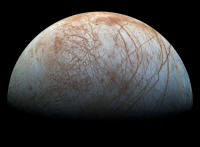Subsurface ocean on Jupiter's moon
 Send a link to a friend
Send a link to a friend
[June 25, 2020]
By Will Dunham
WASHINGTON (Reuters) - Scientists have
figured out how the subsurface ocean on Jupiter's moon Europa may have
formed and determined that this vast expanse of water may have been able
to support microbial life in the past.
Europa, with an ocean hidden beneath a thick shell of ice, long has been
viewed as a potential habitat for extraterrestrial life in our solar
system, alongside other candidates such as Mars and Saturn's moon
Enceladus. A new study presented on Wednesday at a geoscience conference
underscores its potential.
Europa's ocean may have formed after water-rich minerals ejected their
water thanks to heating caused by the decay of radioactive elements in
its interior early in its history, the researchers found.
The effect of tides caused by Europa's gravitational interactions with
Jupiter - the solar system's largest planet - and two other large Jovian
moons, Io and Ganymede, also may have played a role.
"We think Europa's ocean may have been habitable early when it formed
because our models show that the ocean's composition may have been only
mildly acidic, containing carbon dioxide and some sulfate salts," said
planetary scientist Mohit Melwani Daswani of NASA's Jet Propulsion
Laboratory, the study's leader.
"The availability of liquid water is the first step to habitability. In
addition, chemical exchange between the ocean and the rocky interior may
have been significant in the past so potential life may have been able
to use chemical energy to survive."
Daswani said microbes akin to certain Earth bacteria that use carbon
dioxide for energy could have survived using ingredients available in
Europa's early ocean.
[to top of second column]
|

A view of Jupiter's moon Europa created from images taken by NASA's
Galileo spacecraft in the late 1990's, according to NASA, obtained
by Reuters May 14, 2018. NASA/JPL-Caltech/SETI Institute/ Handout
via REUTERS/File Photo

Europa is slightly smaller than Earth's moon. Europa's ocean,
perhaps 40 to 100 miles (65 to 160 km) deep, may contain double the
water of Earth's oceans.
The study evaluated whether Europa was previously habitable and did
not examine its present habitability, a question the researchers are
now exploring.
"A word of caution," Melwani Daswani said. "If a place is habitable,
it does not mean that it is actually inhabited, just that the
conditions could allow for the survival of some extremely hardy
forms of life that we know of on Earth."
(Reporting by Will Dunham; Editing by Sandra Maler)
[© 2020 Thomson Reuters. All rights
reserved.] Copyright 2020 Reuters. All rights reserved. This material may not be published,
broadcast, rewritten or redistributed.
Thompson Reuters is solely responsible for this content. |